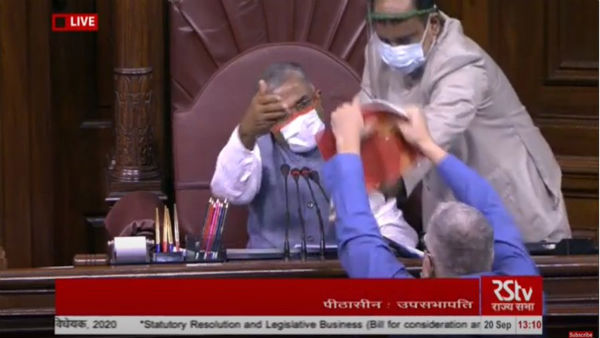Rup Narayan Das
What happened at the Chamber of Rajya Sabha in the just-concluded session of Parliament, when Opposition members protested against the passage of the farm Bills, was most unfortunate and stands out in the recent history of Indian Parliament. The act can be termed as a misdemeanour falling short of misconduct in the course of the Parliamentary proceedings.
Parliament had to pass important Bills and discuss emergent issues like the situation along the Line of Actual Control (LAC). It was with great difficulty that the session was convened amidst the pandemic which has affected one and all. It was a constitutional requirement for the House to meet as there cannot be a gap of more than six months between the last sitting and the ensuing session of the House.
As such, the brief time before the House was precious. The pandemonium has largely dented and sullied people’s perception towards the highest representative body and the image of the law-makers. It has raised cynicism about the credibility of the august house. It is worth the while to recall the observations of Lord Nolan who chaired a relevant committee of the House of Lords in 1995.
He said, “We cannot say conclusively that the standards of behaviour in public life have declined. We can say that conduct in public life is more rigorously scrutinised than it was in the past, that the standard which the public demand remains high, and that the great majority of people in public life meet those high standards.”
The unfortunate incident has raised the imperative and necessity as how to check such incidents in future. It is pertinent to mention in this connection that the Speaker of the Lok Sabha had constituted a committee under the chairmanship of the veteran parliamentarian V. Kishore Chandra Deo in May 2007 to inquire into instances of misconduct including misuse of privileges and facilities by members of the Lok Sabha. The committee was further authorised to look into the desirability of defining what acts would amount to misconduct on the part of a member and make suitable recommendations regarding action against such misconduct. The terms of reference further said the Speaker will decide whether the member or the members will attend the House till a suitable decision is taken after the submission of the report by the committee.
The committee sought views from the stakeholders in the political spectrum including the civil society and the judicature. The committee, through a questionnaire addressed to the stakeholders, sought to elicit their views on some pertinent issues such as the desire and ability to define as to what can be construed as misconduct and also the need to codify them and some related issues. Veteran parliamentarian the late President Pranab Mukherjee opined that misconduct is nothing but “conduct unbecoming of a member of Parliament,” not only in discharge of his parliamentary functions but also in the discharge of his public duties and probity of conduct in private life to the extent it impacts on the performance of his public duties.
Mukherjee further observed that what amounts to conduct “unbecoming of a Member of Parliament” depends on the facts and circumstances. A contrarian view was given by the legal fraternity including Soli Sorabjee and PP Rao who observed that it was desirable and necessary to codify such actions of MPs which would amount to misconduct so that there is a deterrent for members.
Those who had seen the stellar performance of eminent parliamentarians would only feel pained and anguished at the bedlam that happened in the chamber of the Rajya Sabha. There is need for serious debate in the House and the bills that were hurriedly passed warranted a serious debate. It is incumbent upon the lawmakers to keep the interest of the people in mind, and not the partisan political considerations.
The conduct of members should be exemplary; the debate in the House illuminating. The government is duty-bound to listen to the just and fair argument and points of views and amend the laws accordingly if a situation so demanded. What the country needs is substantive democracy and not merely a functional democracy which simply conforms to the procedural and constitutional requirements.
The writer is a former joint secretary of the Lok Sabha Secretariat. Views are personal.
